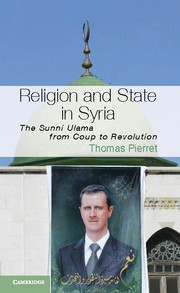Book contents
- Frontmatter
- Contents
- Acknowledgements
- A Note on Conventions
- Introduction
- Prologue
- 1 The Era of the ‘Founding Sheikhs’ (1920–1979)
- 2 Landscapes after the Battle (1979–2007)
- 3 (Re)defining Orthodoxy against Reformist Trends
- 4 The Turban and the Chequebook
- 5 Ulama and Islamists in the Political Field
- 6 Reforms and Revolution
- Conclusion
- Bibliography
- Index
- References
2 - Landscapes after the Battle (1979–2007)
Published online by Cambridge University Press: 05 February 2013
- Frontmatter
- Contents
- Acknowledgements
- A Note on Conventions
- Introduction
- Prologue
- 1 The Era of the ‘Founding Sheikhs’ (1920–1979)
- 2 Landscapes after the Battle (1979–2007)
- 3 (Re)defining Orthodoxy against Reformist Trends
- 4 The Turban and the Chequebook
- 5 Ulama and Islamists in the Political Field
- 6 Reforms and Revolution
- Conclusion
- Bibliography
- Index
- References
Summary
In 1975, the Syrian authorities arrested Marwan Hadid (1934–76), a Muslim Brother from Hama who had advocated armed struggle for a decade. Hadid, who would soon die in custody, had just published a pamphlet in which he denounced the ‘cowardice’ of the ulama, telling them that their attitude would not protect them from the blows of the regime, or from the wrath of the Almighty:
Here is what I fear for you: that if the worshippers of God launch the struggle against His enemies, you behave as spectators, without fighting, and therefore the enemies of God will crush you while you are in your homes, and then you will go to Hell.
Hadid’s prophecy proved to be partially correct. When the uprising erupted, only a minority of the sheikhs wholeheartedly sided with the armed opposition, but all of them suffered to varying degrees from state repression, except the most loyal supporters of the regime. Indeed, since it was increasingly unwilling to integrate the religious elite into the state apparatus, the regime chose instead to redraw the country’s religious map by supporting loyal, but privately funded, clerical networks.
This policy was not entirely successful, however, which highlights the limits of state action in the religious field. Whereas the post-uprising reshuffling has proved durable in Aleppo, where certain clerical networks were bled dry by state repression, in Damascus the end of the twentieth century saw an impressive comeback by religious forces that had been apparently eliminated after 1982, but nevertheless managed to revive thanks to the depth of their social roots. As a result, the regime had no choice but to reach out to these former enemies.
- Type
- Chapter
- Information
- Religion and State in SyriaThe Sunni Ulama from Coup to Revolution, pp. 64 - 99Publisher: Cambridge University PressPrint publication year: 2013



